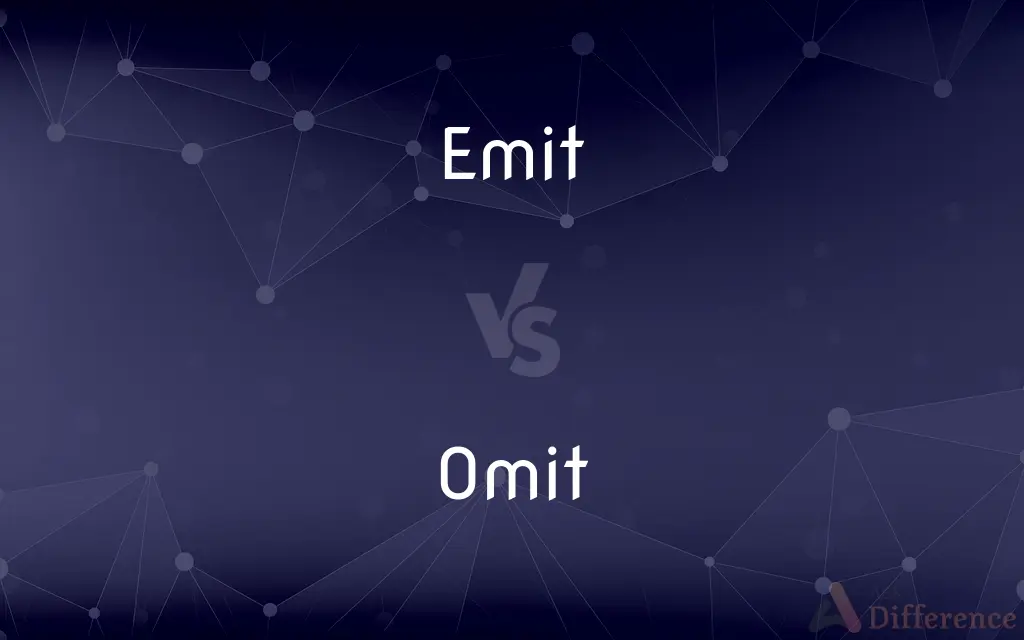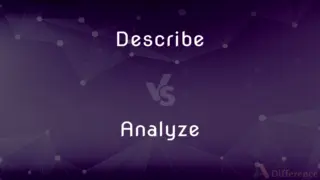Emit vs. Omit — What's the Difference?
By Urooj Arif & Maham Liaqat — Updated on March 28, 2024
Emit means to send out or give off something like light or sound, while omit means to leave out or exclude something from consideration or inclusion.

Difference Between Emit and Omit
Table of Contents
ADVERTISEMENT
Key Differences
Emit involves the release or production of something, often related to energy, signals, or substances, such as light, heat, sound, or gases. This action is usually a natural or mechanical process where something is sent out into the surrounding environment. On the other hand, omit refers to the act of leaving something out, either intentionally or accidentally. It implies a decision or oversight resulting in the exclusion of an element, detail, or fact from a larger body of work, discussion, or consideration.
When something emits light or sound, it is actively producing and discharging these elements, making them perceivable to the senses or instruments. Emitting is a physical or chemical process that can be observed and measured. In contrast, to omit is to pass over or neglect to include something, which is more of an abstract action, often related to language, communication, or processes. Omission is a concept or action that results in the absence of something that might have been expected to be present.
The concept of emission is crucial in various scientific disciplines, such as physics, chemistry, and environmental science, as it often involves understanding the mechanisms and impacts of what is being emitted. Emissions can be natural, like the sun emitting light, or man-made, like a car emitting exhaust fumes. Conversely, omission is a concept that finds its importance in fields such as literature, law, and data analysis, where the completeness and accuracy of information are critical. An omission can change the context or understanding of a text, legal document, or dataset.
Environmental regulations frequently focus on controlling emissions due to their potential impact on air quality, climate change, and public health. These regulations aim to reduce harmful emissions from various sources. On the other side, ethical and professional standards often address omissions, emphasizing the importance of inclusivity and completeness in reporting, storytelling, and data presentation. Omitting crucial information can lead to misunderstandings, misinformation, or ethical breaches.
In technology and engineering, devices and systems are designed to emit certain signals or energies for them to function or communicate, like a Wi-Fi router emitting signals. The design process carefully considers what these systems should emit to achieve desired outcomes. In contrast, in editing and writing, much attention is paid to what is omitted from texts to ensure clarity, conciseness, and relevance, demonstrating how both concepts play crucial roles in communication and technology, albeit in vastly different contexts.
ADVERTISEMENT
Comparison Chart
Definition
To send out or discharge something, such as light, sound, or gas.
To leave out or exclude something from consideration or inclusion.
Process
Active release or production of substances, energy, or signals.
Intentional or accidental exclusion of an element or detail.
Field of Relevance
Physics, chemistry, environmental science.
Literature, law, data analysis.
Examples
A bulb emitting light, a plant emitting oxygen.
Omitting a name from a list, leaving out a detail in a story.
Impact
Can affect the environment, health, and technological functions.
Affects understanding, completeness, and accuracy of information.
Compare with Definitions
Emit
Emit means to produce and release something, such as light or sound.
The fireflies emit a soft glow in the dark.
Omit
Omit means to leave something out intentionally or by oversight.
She decided to omit the controversial chapter from her book.
Emit
It involves sending out energy or signals.
The radio tower emits signals that can be received miles away.
Omit
It involves not including something in a list or document.
He realized too late that he had omitted a critical step in the instructions.
Emit
Emit can refer to substances being released into the air.
Volcanoes emit ash and gases during an eruption.
Omit
It's used in software development regarding unused code.
The final version of the software will omit all deprecated functions.
Emit
In biology, emit refers to organisms releasing substances.
Flowers emit a fragrance to attract pollinators.
Omit
In cooking, omit refers to leaving out an ingredient.
Omit the salt if you're watching your sodium intake.
Emit
It's used in discussions about environmental pollution.
Factories emit carbon dioxide and other greenhouse gases.
Omit
Omit can mean skipping over parts when reading aloud.
The teacher chose to omit the graphic descriptions for the classroom reading.
Emit
Produce and discharge (something, especially gas or radiation)
Even the best cars emit carbon dioxide
Omit
To fail to include or mention; leave out
Omitted an important detail from the report.
Emit
To give or send out (matter or energy)
Isotopes that emit radioactive particles.
A stove emitting heat.
Omit
To fail or neglect to do (something)
Omitted his daily walk during our visit.
Emit
To give out as sound; utter
"She emitted her small strange laugh" (Edith Wharton).
Omit
To fail or neglect (to do something)
I omitted to mention that I don't eat meat.
Emit
To voice; express
Emit an idea.
Omit
(transitive) To leave out or exclude.
Emit
To issue with authority, especially to put (currency) into circulation.
Omit
(intransitive) To fail to perform.
Emit
(transitive) To send out or give off.
Omit
To delete or remove; to strike.
Emit
And VB|passage=The controls then emit client-side HTML code that is appended to the final page output.}}
Omit
To neglect or take no notice of.
Emit
(intransitive) To come out, to be sent out or given off.
Omit
To let go; to leave unmentioned; not to insert or name; to drop.
These personal comparisons I omit.
Emit
To send forth; to throw or give out; to cause to issue; to give vent to; to eject; to discharge; as, fire emits heat and smoke; boiling water emits steam; the sun emits light.
Lest, wrathful, the far-shooting god emitHis fatal arrows.
Omit
To forbear or fail to perform or to make use of; to leave undone; to neglect; to pass over.
Her father omitted nothing in her education that might make her the most accomplished woman of her age.
Emit
To issue forth, as an order or decree; to print and send into circulation, as notes or bills of credit.
No State shall . . . emit bills of credit.
Omit
Prevent from being included or considered or accepted;
The bad results were excluded from the report
Leave off the top piece
Emit
Expel (gases or odors)
Omit
Leave undone or leave out;
How could I miss that typo?
The workers on the conveyor belt miss one out of ten
Emit
Give off, send forth, or discharge; as of light, heat, or radiation, vapor, etc.;
The ozone layer blocks some harmful rays which the sun emits
Emit
Express audibly; utter sounds (not necessarily words);
She let out a big heavy sigh
He uttered strange sounds that nobody could understand
Common Curiosities
How does omit differ from emit?
Omit involves the exclusion or leaving out of something, while emit involves the production and release of something.
Can something be emitted unintentionally?
Yes, emissions can be unintentional, such as a leak emitting gas, though the term often implies a direct source or action.
How are emissions measured or controlled?
Emissions are often measured with instruments that can detect and quantify the type and amount of substances emitted, and controlled through regulations and technology.
What are the environmental impacts of emissions?
Emissions can have significant environmental impacts, including air and water pollution, climate change, and harm to wildlife and ecosystems.
Is omitting always a negative action?
Not necessarily. Omitting can be strategic for clarity or relevance, though it can also result in incomplete or misleading information.
What does it mean to emit something?
Emitting means actively producing and releasing something, like light, sound, or gases, from a source.
Can omitting be corrected in a final product or publication?
Yes, omissions can sometimes be corrected in subsequent editions or versions, especially if their absence is noted to affect understanding or completeness.
What are common contexts for emissions?
Common contexts include environmental science for pollutants, physics for light and sound, and technology for signals.
Can emissions be beneficial?
Yes, some emissions, like the release of oxygen by plants, are beneficial and essential for life on Earth.
Why might someone omit details intentionally?
Details may be omitted for various reasons, including to simplify information, avoid sensitive topics, or focus on key points.
Are there legal implications for both emitting and omitting?
Yes, improper emissions can violate environmental laws, while omissions can lead to legal issues if they result in misinformation or harm.
What are the consequences of omitting steps in a procedure?
Omitting steps in a procedure can result in failure, safety hazards, or ineffective outcomes, highlighting the importance of detailed instructions.
How do regulations address emissions?
Regulations often set limits on the type and amount of emissions that can be released by various sources to protect public health and the environment.
How can one ensure they do not omit important details?
Ensuring no important details are omitted can involve thorough review processes, checklists, and seeking feedback from others.
Are there ethical considerations in omitting information?
Yes, ethically, omitting information that affects understanding, decision-making, or safety can be considered misleading or deceptive.
What is the significance of emissions in climate change?
Emissions of greenhouse gases are significant drivers of climate change, affecting global temperatures, weather patterns, and sea levels.
What role does technology play in controlling emissions?
Technology plays a crucial role in monitoring, reducing, and controlling emissions through innovations like filters, scrubbers, and renewable energy sources.
How does omitting information affect research?
Omitting critical data or information in research can lead to inaccurate results, misinterpretations, and challenges in replicability.
Share Your Discovery

Previous Comparison
Kryptonite vs. Krypton
Next Comparison
Describe vs. AnalyzeAuthor Spotlight
Written by
Urooj ArifUrooj is a skilled content writer at Ask Difference, known for her exceptional ability to simplify complex topics into engaging and informative content. With a passion for research and a flair for clear, concise writing, she consistently delivers articles that resonate with our diverse audience.
Co-written by
Maham Liaqat













































